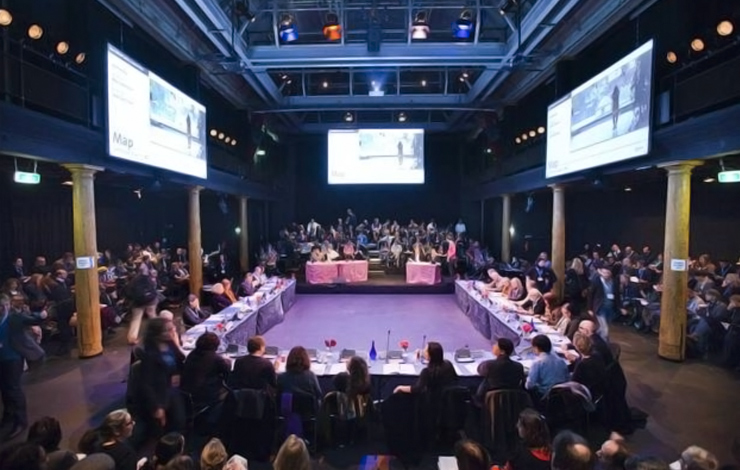
If you want to find out how to get your pet doc project funded, and get a crash course in cultural sensibilities at the same time, don't take a class—go to the Amsterdam Forum. The November event, held for three days during the fantastic International Documentary FilmFestival Amsterdam (IDFA), draws much of the world's best documentary talent and power brokers together to talk docs.
The numbers themselves are impressive: During the most recent Forum, 47 films were pitched from 18 different countries, in front of 115 commissioning editors and 46 representatives of film funds and institutes, sales agents and distributors. While the majority of broadcasters were European, the Forum each year pulls an increasing number from the rest of the world, including the US, represented this year by Sundance Channel, HBO, The Documentary Channel and WGBH, among others.
The Forum is gripping not only for the insights it gives into the commissioning process but also for the introduction to a range of stories offered by talent from around the world. This year's pitches included stories about South African women drag car racers (Ochre Moving Pictures, Johannesburg); the Pentagon in Hollywood (Les Films d'Ici, Paris); night-time in China (Trench Film Group, Beijing); tales from an East European bus route (OU Acuba Film, Estonia); and Communist jokes (Bergmann Pictures, London).
Here's how it works: In order to apply you need to have at least a quarter of your financing in place, and a funder/commissioning editor willing to sit at the pitching table with you. If your project is selected for pitching (and this year your odds were roughly one in four), you and your producer/director will have to prepare a pitch of no more than seven minutes. There will then be eight minutes for discussion, led by moderators, who will try to focus on commissioning editors most likely to come through with the money. The Forum organizers estimate based on surveys that 83 percent of projects pitched secure additional financing.
Much like the Roman forum of old, the Amsterdam Forum is a spectacle that is discomforting (but potentially rewarding) for the participants and greatly enjoyed by spectators; the event is open to a limited number of observers. Pitching can be a humbling experience, even (and perhaps especially) for distinguished doc makers. Veteran Israeli filmmaker Avi Mograbi pitched his new film Masada—The Real Story with French producing powerhouse Serge Lalou (Etre et Avoir/To Be and To Have). "Here I am feeling like a gladiator," Mograbi joked at the beginning of the pitch. "If I do bad here I will be eaten by the lions." He wasn't joking afterwards; the film received a lukewarm reception that left both Mograbi and Lalou deflated. While one of the commissioning editors was clearly unfamiliar with Mograbi's distinctive body of work and unable to grasp the film's concept, another complained about Mograbi's habit of referring to himself in the third person, sidetracking the conversation.
And that's the danger in pitching. With so many "important" people at the table armed with microphones, discussions sometimes go awry, despite the presence of moderators keeping track of the precious time. One of the biggest distractions can be showing footage during the pitch, as it can be mistaken as a microcosm of the film itself. "Personally I think [footage screenings are] dangerous because they can mislead as much as they can indicate what you're going to do," says London-based director Peter Day, who pitched Riot On!, a film about the mobile phone revolution, with Finnish co-producer John Hakalax. The pair did use a trailer, even though it went against Day's better judgment. "In this case it was a movie trailer; it had a real cinematic feel about it, rather than a compilation of rushes." The gamble worked as the pitch succeeded in securing the interest of one of the table's biggest broadcasters—ARTE Germany.
Despite the risks, trailers often succeed at bringing characters to life. London-based Iranian director Taghi Amirani arrived at the Forum with footage of his main characters—a Canadian woman and a Masai warrior who had fallen in love and married. Amirani's film, Love in Lion Country, wasn't scheduled to be pitched at the Forum, but he was hoping to be successful in the "Moderator's Hat"—five slots at the Forum reserved for projects picked out of a hat and pitched on the spot. Amirani was in luck-not only was his project picked and pitched but it was warmly received. He is now in discussions with CBC Canada and Channel 4 in the UK.
Amirani's success with Channel 4 shows that sometimes you have to go abroad to get interest from your own country. And as producers know only too well, most of the work comes after the pitch, in chasing down commissioning editors who sounded very positive about projects but proved more than elusive in the days and weeks following the Forum.
Carol Nahra is a freelance journalist and documentary producer. As head of development for the UK independent production company Stampede, she develops documentary films and series for British and international broadcasters.
